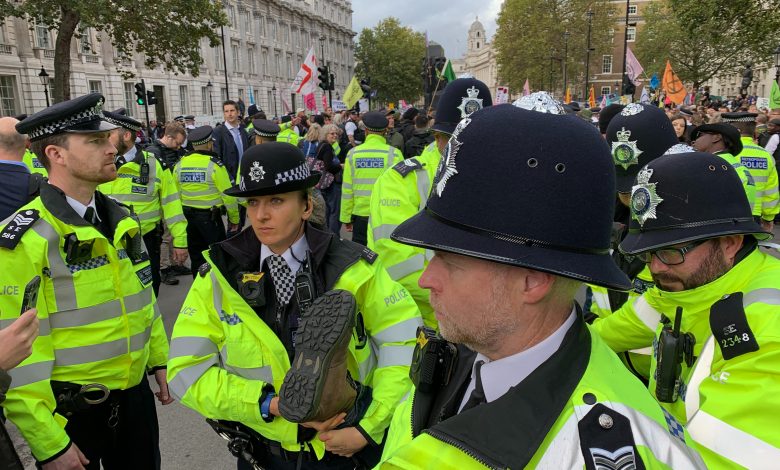Is Disorderly Conduct a Crime?

Every state defines disorderly conduct in different ways. The types of acts that fall under disorderly conduct vary from one state to another (for example, some states consider wearing a mask in public as a type of disorderly conduct). Then again, the intensity of an act must be taken into consideration as well. For example, unreasonable noise could be a disorderly conduct. But how much noise is unreasonable noise? Again, tumultuous conduct is another type of disorderly conduct. But what constitutes ‘tumultuous conduct’?
So while disorderly conduct is an offense like many others, the thing about disorderly conduct is that it is quite hard to decide if a person should be booked for disorderly conduct. Because of this disorderly conduct statutes give police officers and other similar authorities the power to use discretion to arrest people whose activities they might find undesirable for several kinds of reasons.
Common terms related to disorderly conduct
Misdemeanor – A less serious assault crime that usually does not involve any serious injury.
Felony – A crime that involves violence and is regarded much more seriously than a misdemeanor.
Offender – The person reported to have carried out the crime.
Defendant – The person against whom a lawsuit has been filed or who is accused of a crime or offense.
Victim – Anyone who suffers physical, mental, or emotional harm directly by a criminal offense.
Recognizance – A bond that a person signs before a court or magistrate to observe a particular condition, such as appearing in court when summoned.
Arraignment – The formal reading of a criminal charge document in the presence of the defendant to inform them of the charges made against them.

What are the federal regulations regarding disorderly conduct?
According to the federal regulations:
A person commits disorderly conduct when they cause public nuisance, violence, alarm intentionally, or if they cause risk recklessly.
The following prohibited acts are termed as disorderly conduct:
- Engaging in threatening, fighting, or violent behavior
- Using language, an utterance, or a gesture
- Engaging in an act that is obscene, menacing, or physically threatening
- Acting in a manner that can injure or incite an immediate destruction of the peace
- Making noise that is beyond reasonable, considering the purpose, as well as the nature of the person’s conduct, the time of day/night, location, and any other factors that would govern the conduct of a reasonably prudent person under the circumstances
- Creating or maintaining a dangerous or physically dangerous condition
- Loitering in certain areas

Disorderly conduct laws by state
California
The California law clearly defines what acts constitute disorderly conduct.
According to Section 647, any person is guilty of disorderly conduct if they commit any of the following acts:
- Asking anyone to engage in (or who engages in) lewd conduct in any public place, or place that is open to the public, or exposed to public view
- Asking for, or agreeing to engage in, or engaging in prostitution
- Meeting with people in public places or any place open to the public to beg or ask for alms
- Loitering around public toilets to engage in or solicit any vulgar or unlawful acts
- Housing in any private or public building, construction, vehicle, or building without the permission of the owner or the person who is in control of that property
- Found in public places, intoxicated and under the influence of drugs, controlled substances, alcohol, toluene, or a combination of any of the above; not having the capability to consider their own safety or the safety of others; the intoxication, interferes with, obstructs, or prevents the free use of streets, sidewalks, or any other public way
- Sneaking around or prowling around the private property of another person; peeking into the doors and windows of an inhabited building, without any known lawful business with the occupants or the owner of that property
- Sneaking around or prowling around the private property of another person, lingering on that property without a lawful reason for being on that property, and for the purpose of committing a criminal offense whenever opportunity presented itself
- Peeping into a bedroom, bathroom, fitting room, changing room, tanning booth, or dress salon with an instrument such as a telescope, binoculars, camcorder, camera, or even a motion picture camera with the intention to invade the privacy of the occupants
Texas
Intentionally and knowingly performing any act that is considered disorderly conduct is enough to be charged with disorderly conduct. If the defendant performed the act unintentionally or without knowing that their behavior disturbed the peace, they will not be convicted for disorderly conduct.
New York
In New York, the intent to cause any public inconvenience, alarm, or any type of annoyance, or to recklessly create such type of a risk are deemed as disorderly conduct. Disorderly conduct is not considered a felony or a misdemeanor, but it is considered a violation. The following are considered as disorderly conduct:
- Engaging in fights or in violent, threatening, or tumultuous behavior
- Making unreasonable noise
- Using abusive or obscene language in public
- Making obscene gestures in public
- Disturbing any lawful assembly/meeting of persons without lawful authority
- Obstructing vehicular or pedestrian traffic
- Congregating with other people in a public place and refusing to comply with the police to disperse
- Creating a hazardous or physically-offensive condition by an act that serves no legitimate purposes

Frequently Asked Questions
Why was I let off with a disorderly conduct charge previous times but got cited with disorderly conduct the last time?
Disorderly conduct is very common, and on an average day, one can see at least one person acting in a way that could get them charged with disorderly behavior. The difference between receiving a charge of disorderly conduct and not receiving such a charge is that the police were not called on previous occasions.
Secondly, the temperament of the arriving officer plays an important part in whether you are charged or not. If he does not like your behavior but you have not done anything else wrong, he can either just let you go with a warning, or he could charge you on the spot for disorderly conduct.
Can you go to jail for disorderly conduct?
Most disorderly conduct cases are viewed as misdemeanors or violations – depending on the state the incident occurred. But depending on the seriousness of the offense, you could be taken to the local jail. You will stay there until your arraignment.
An arraignment on a new arrest can take up to 24 hours before the criminal court judge sees you. You will either be released on your own recognizance (ROR) or via bail. Most often, people are released on ROR. When you sign a ROR bond, you are promising the court that you will appear for all future court appearances and that you will not engage in any type of illegal activity while you are out on ROR.
Dangerous and disruptive behavior is an offense that can get you locked up. For example, if you start a riot, or incite a riot, you can be charged with a felony.
If this is your second or third offense of disorderly conduct, you can be charged with more serious criminal charges.
Habitual offenders and repeat offenders are penalized for their behavior – even if their acts are considered misdemeanors.
Is disorderly conduct serious?
Most often, disorderly conduct is not considered a serious crime. Rather, it is seen as a misdemeanor. In some states like New York, disorderly conduct is not even deemed a misdemeanor, but merely a violation. However, a charge of disorderly conduct should not be taken lightly. Repeat offenders are booked for more serious crimes and have more serious penalties to deal with.
What happens if I get charged with disorderly conduct?
When you are charged with disorderly conduct, a police officer will issue a summons or a desk appearance ticket for disorderly conduct. The police are authorized to arrest you and even detain you for arraignment (trial) in court for different kinds of misdemeanors or minor infractions. During the arraignment, you will be brought before a court of law, the charges made against you will be read to you, and you will be required to answer for those charges.
What kind of penalty can a person get for disorderly conduct?
Just as the definition of disorderly conduct is different from one state to another, so are the penalties. Penalties can be varied and depend on the nature of the offensive behavior. For lesser or milder offenses, you will be issued a citation that will require you to pay a fine – it is quite similar to a traffic ticket.
More dangerous, serious, or disruptive behavior invites more serious penalties. You could be brought to the local police station and jailed for a night or until you are bailed out. Jail time can be up to a year for repeat offenders or for more serious instances of disorderly conduct.
Fines are another common punishment for disorderly conduct convictions and can range from $25 to $1,000 or more. Courts often impose a fine for disorderly conduct rather than jail or probation.
Probation for several months is quite common. Violation of a probation can lead to the court imposing a more significant punishment, such as a certain period in jail or a higher fine.
What should I do if I am charged with disorderly conduct?
If you are charged with disorderly conduct, get in touch with a qualified lawyer in your area – no matter how minor the charge is. Only an experienced lawyer can handle your case in the local court, deal with the police, and legally advise you on your options.
How much does a lawyer cost for disorderly conduct?
The cost of a defense lawyer will depend on the type and severity of the offense. For example, a second-degree charge is a simple charge and includes different types of first offenses. An average lawyer will charge you anywhere between $1,500 and $3,500. You can find affordable lawyers for as low as $750, while some expensive lawyers will go up to $5,0000.
A first-degree charge is more serious since it is punishable by up to one year in jail and/or a higher fine. Possessing marijuana is an example of a first-degree disorderly conduct. Lawyers can charge anywhere between $2,000 and $3,500 to take up your case.
Keep in mind that the price of hiring a lawyer varies from one state to the next.
Also, do not hire a lawyer only because they are cheap. Hire one who is capable of convincing the judge in the criminal court that the charges against you are not sustainable and insufficient and must therefore be dismissed.
Will disorderly conduct show up on a background check?
Yes, it will show up unless you have it expunged. If you have no other charges against you, you are eligible to get your charges expunged. Many people try to do the expungement themselves, but it is strongly advised that you get a lawyer to do it for you, as there are several steps involved in the process.
Most job applications only ask for felony convictions. Disorderly conduct is not a crime, so chances are that it will not impact your hiring process. If not expunged, a background check could affect future housing prospects and obtaining government documentation.
An FBI level background check might still show your disorderly conduct charge, but the good news is that most employers do not perform such a high level of background check. You are not a convicted criminal, and if prospective employers ask you if you were ever convicted of a crime, your honest answer is “no.”

How to expunge a disorderly conduct charge
- Make sure you are eligible to apply for expungement in your state. This would involve not having any criminal convictions for a certain time frame.
- Request certified copies of your criminal record. This will be available at your state’s bureau of criminal identification. You will need to provide these copies to all parties that need to approve your expungement.
- Fill out the application/petition for expungement. You will have to petition the convicting court in your state. You might be able to do this online, as most states have an online form that can be downloaded and filled out. Your state might require you to get the application notarized.
- Obtain the approval from all the parties concerned. While some states just require a sign off from the court, others require a full hearing before a judge. Some states will require you to get approval from the convicting court, as well as the prosecuting agency that handled the case. Bear in mind that neither a judge nor a prosecutor is obligated to agree to sign your expungement request form.
- File the expungement application with your state’s bureau of criminal identification. At this point, you are required to pay a fee for filing and submitting the completed application. Again, the costs vary from one state to another, but it is typically around $100.
- Be patient – it will take a few months before you hear back regarding your approval. If your application is approved, the disorderly conduct charge will not appear on your record.
How to defend a disorderly conduct charge
Depending on what the “disorderly” action or activities were at the time of your arrest, you can use one of these three common defenses:
- Freedom of speech – If you were loud, obnoxious or offended someone by what you said, your lawyer can argue that you were simply expressing your feelings and not engaging in disorderly conduct.
- Involuntary actions – Your lawyer can argue that you were not in control of yourself, and therefore cannot be held liable for your involuntary actions. You will, however, need to prove that you have a medical condition or some such condition that caused you to behave the way you did.
- Self-defense – If a physical altercation took place at the time of your arrest, you could argue that you acted to defend yourself. This defense will be stronger if you have witnesses who can back you up by telling the judge about what they saw.



